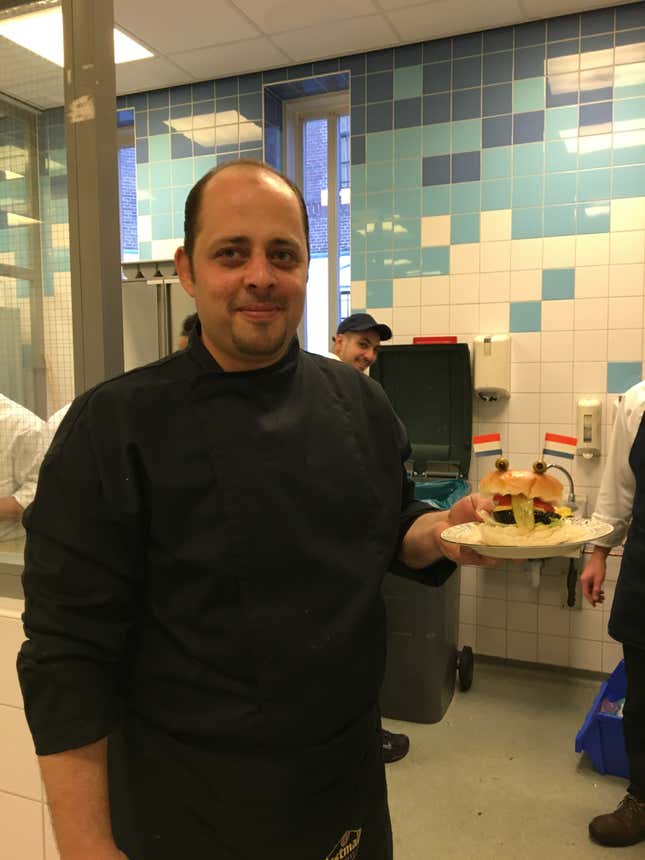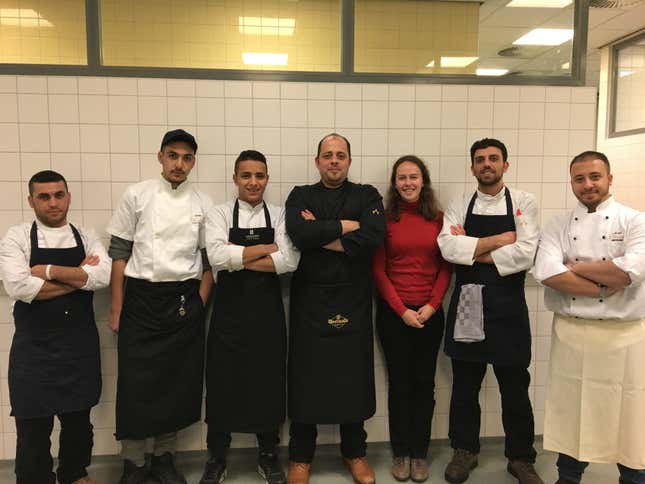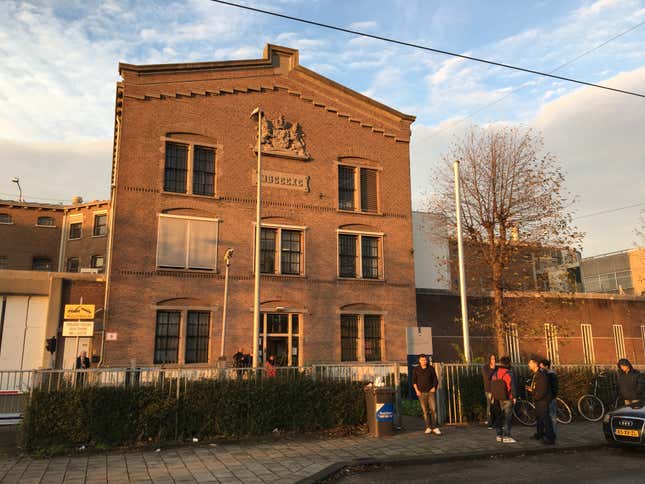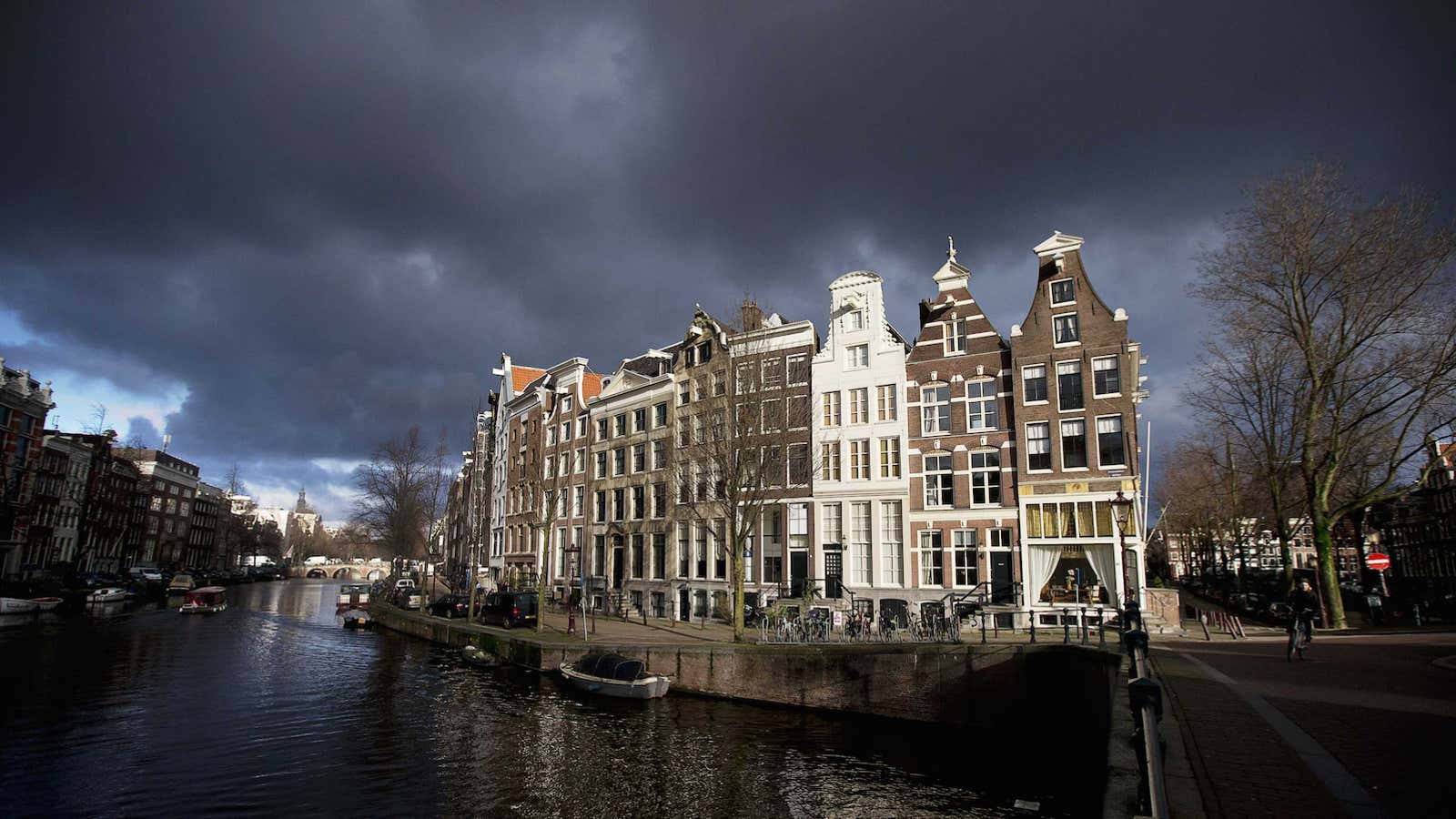Amsterdam
Just a 15-minute tram ride away from the heart of Europe’s sin city, a motley crew of Syrian refugees are cooking up delicious fare in an unlikely setting: a former women’s prison.
Once known as Vluchthaven, this stern brick building has been transformed into a refugee shelter for over 200 asylum seekers from Syria, Afghanistan, Iraq and beyond. As you shuffle past the guards at the door, four floors of bare white walls lit up by garish fluorescent lamps soar imposingly up above you, linked together by snaking black metal railings.
Sounds grim—until you notice a bustling kitchen where, in a flurry of activity, creamy hummus, baked aubergine laced with pomegranate seeds, spiced rice with raisins and lentils, a tabouleh salad of tomatoes, red onions, parsley, mint, garlic and couscous and other dishes are being prepared. The bowl of Dutch chips in the corner, next to a vegan hamburger, look distinctly dejected.
The chefs responsible for the feast are no ordinary cooks; they’re refugees from Syria, led by former lawyer Kamal Naaje.

“Dutch food is good—the volunteers are very generous in bringing it to us—but it is bland. We’re not used to it. We like spices—salty, sweet, sour flavors,” Naaje tells Quartz.
“Here, they sometimes don’t even use salt!” one of the volunteers adds. Since September, Naaje and his team have been supplementing the basic camp meals of rice and pasta dishes with hummus, salads and other typical Middle Eastern side dishes that are loved by the others in the camp. “Cooking also makes me feel less home sick,” Naaje says, smiling.
Like millions of other Syrians, Kamal’s life changed irreversibly with the war that began in 2011. Until then, he had been a successful lawyer, running his own practice and living in a spacious house with his wife and two children, aged five and eight.
Today, Kamal doesn’t even know if his house is still standing or if it has been destroyed in the bombardments in Damascus. “It’s located in one of the no-go areas,” he explains, saying that it would be too dangerous for anyone to even go and check. Worried that the perilous journey would be too risky to undertake as a family, Kamal left his family with relatives in the Middle East and decided to flee to Europe alone.
Many of the refugees at Vluchthaven shudder when they think back to those journeys. Like Kamal, few want to divulge specific details. But accounts of crowded rubber boats wobbling precariously in the middle of the sea with no land in sight, journeys on foot across countries, or of being furtively stashed away for days at a time in the stinking, airless, cramped backs of trucks are common to many of those in refugee camps across Europe. Thousands of others never survived to tell their stories.
Kamal says he knew from the start that he wanted to come to the Netherlands “because of its reputation for upholding human rights and democracy.” But when he arrived in Sept. 2015, he found that the process of obtaining a refugee status long and arduous.
He is not alone. Hundreds of thousands of refugees face the same struggles: After months of crossing countries and living on adrenaline and instinct, arriving in Europe and having to wait while their spouses and children remain in difficult circumstances back is hard enough. For many, it is made worse by devastating memories of the horrors they’ve left behind.
Though not enough research has been done to date on this, a study released by the German chamber of psychotherapists in Sept. 2015 states that more than half of all refugees who arrive in Germany are diagnosed as suffering from trauma-induced problems, while more than 70% of them have witnessed violence and around 50% have directly experienced it.
This is compounded by a “resettlement crisis”, as Marzia Marzagalia a psychiatrist who treats victims of torture in Italy told VICE:
What if you risked your life to flee your country to reach Europe and you suddenly found out that Europe was just a huge lie, a mirage?
Frustrated by the wait, Kamal decided he had to do something. The kitchen was already there, a remnant from its prison days.

“When I came, the next day some volunteers from the Salvation Army brought vegetables. But no one knew how to prepare them properly. So I said, it’s ok, I can do it,” he says. Salvation Army volunteers at the shelter gave him permission to use the kitchen and the day after arriving in Amsterdam, Kamal began cooking to supplement the meals provided.
Kamal says he’s always enjoyed cooking and has worked part-time in restaurants throughout his university studies—first in Syria, picking up shifts in between lectures, and then in the US while he was studying for his master’s degree in Virginia. After a long day’s work, he would arrive back home and watch re-runs of ‘Hell’s Kitchen’ by British Chef Gordon Ramsay in order to unwind.
Today, posters of Ramsay are all over his kitchen, complete with choice quotes: “Don’t take it personally, take it professionally!”
“I respect him a lot,” says Kamal. “In the kitchen, the ingredients should be perfect, the way of cooking should be perfect and the presentation should be perfect—you shouldn’t miss a single detail.”

Immersing himself in cooking also creates a different—often more pleasant—reality, says Kamal. “When I go into to the kitchen, it’s a very different world for me. There, I forget everything that is going on outside.” He wanted others to share the same experience.
“I started alone, working here for three days—just me. But I wanted to also teach people—so I thought of making a group, a team. I have now seven chefs, and others who want to join.”
His hope is that the cooking initiative spread to other refugee camps in Amsterdam, and beyond.
“Anyone who wants to learn is welcome,” Kamal says. “I hope to teach other people—so that when these people transfer to another camp, they can teach others.”
Cooking also presents a potential first step on a new career ladder. Practicing law in the Netherlands is not an option, says Kamal, who proudly shows me his professional business card from his days as a lawyer. “It’s too difficult. The law is very different here, and if you want to practice it, you have to start from zero. But with cooking, I found a way to help these people here and make them happy. It helps them to forget their stressful situation for a while—the war, their families. I can work from the morning till the evening, until 1am. I can cook for 1000 people—if just to make them happy, I can do it.”
As the news of Kamal’s cooking has spread around Amsterdam and the Netherlands, featured in magazines, newspapers and TV reports (Dutch), it has captured the attention of locals who want to lend a hand.
Jurriaan Momberg, a Dutch businessman, has become an active volunteer at the refugee camp, helping to provide Kamal and his team with the chef uniforms and in other aspects of the venture. The volunteers have also set up a fundraising Facebook page, where Kamal posts photos and recipes and where members of the public can help donate money in order to buy the necessary ingredients and equipment. Through this, and with help from the Salvation Army, the team has been able to expand its cooking volumes to reach more refugees and has upgraded some of the cooking equipment.
“How nice it would it be if you could open a restaurant with Syrian cooks—I think it will also be so good for Holland,” Jurriaan tells Quartz. “As well as providing delicious food and a means of employment for the Syrians, for the Dutch locals the restaurant will also provide a gateway into the warmth of the Middle Eastern culture and people.
“You can come in and meet the people and see what they are like for yourself,” says Jurriaan. “I see Dutch people trying this food, and their reactions are “Wow!” And suddenly, they feel more open to these new people.”
As for Kamal, alongside obtaining a work permit and getting a job, his great hope is that he will be reunited with his wife and children soon. “I’m not worried about children losing their [Syrian] identities here: I respect the people here. I like the freedom, the democracy, the way that it is here—it’s good for the children. It’s their future.”
